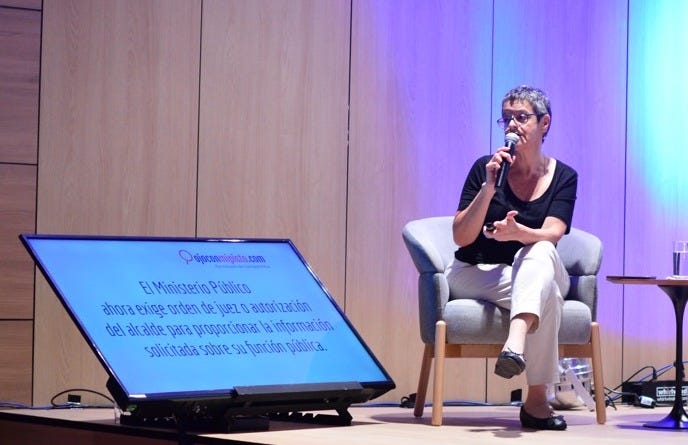Contracts, Data and Investigations - Edition 79
This month: A new guide to detecting red flags, tips from Guatemala’s Ana Carolina Alpírez, and the link between public contracts and organized crime
Welcome to our last newsletter for the year. We hope you’ve enjoyed our tips and insights on investigating public contracts and look forward to providing you with even more leads and ideas in 2025. Something tells us that abuse in public spending ain’t going anywhere just yet. Get in touch about your investigations – we’d love to help.
[What we’re keeping an eye on]
When green energy turns black: The billionaire owner of Adani Group has been indicted in the US over an alleged bribery scheme involving solar power contracts. According to the announcement and indictment, more than $250 million in bribes were reportedly offered to Indian officials in exchange for better terms on energy deals expected to generate more than $2 billion in profits. Adani Group denied the allegations. Kenya subsequently cancelled two contracts with the company, the BBC reports, including a controversial billion-dollar contract to run the country’s main airport for 30 years (which we covered in edition 77). Big money in green energy and climate finance means scrutiny is a must.
Organized crime and public contracts: In Ecuador, suppliers linked to organized crime have won 97 public contracts worth at least $13.5 million dollars since 2010, an investigation by CONNECTAS finds. Due to a lack of coordination among government agencies, 31 of these deals were awarded to beneficiaries as they were being investigated or prosecuted for suspected crimes such as terrorism, drug trafficking, illicit association, and organized crime. Over half of those contracts were entered into with “decentralized autonomous governments”, mostly with municipalities. Similarly, in Honduras, Contracorriente’s Fernando Silva uncovers a direct contract to maintain police helicopters between the Security Secretary and a company that reportedly also does business with a cartel.
[Data insights]
AI: UK’s Tussell has set up a database to track how much the UK public sector has spent on AI and what it’s buying. The platform reveals 995 AI contracts worth £2.4 billion (US$3 billion) were agreed over the last decade. Visit the database and download the data here.
White elephants: Does a city with a population of 16,000 really need a 13,500-seat sports stadium? That’s just one of many seemingly excessive or abandoned infrastructure projects built using revenues from Bolivia’s hydrocarbon tax, examined in an investigation by Verdad con Tinta and CONNETAS’ Jenny Marquez and Jesús Vargas.
In Spain, El Diario is at it again. This time Lucas Marco and Sergio Pitarch explore emergency reconstruction contracts after the devastating floods in Valencia earlier this year. They find one of the first contracts – awarded without competition for over €290,000 – went to his cabinet chief’s former employer. El Diario has also been analyzing local government contracts in recent months, including on Galicia and Andalucía (featured in our 78th edition).
South Africa’s data is now available as open contracting data, thanks to the National Treasury, via its Office of the Chief Procurement Officer. The public procurement data is being published on the eTender Publications Portal. Download it here.
[Tips from practitioners]
Ana Carolina Alpírez at Abrelatam/ConDatos 2023 in Montevideo. Foto: Daniel De León
At long last, Guatemala has started publishing standardized open contracting data this year. But Ana Carolina Alpírez, the director of Guatemalan media outlet Ojoconmipisto, has been using public information to track the use of municipal funds and encourage citizen participation since 2013. We asked for her advice on investigating public procurement.
Getting started with open data on public procurement:
Master Excel: Spreadsheets are your friend, so learn how to do basic analysis with public procurement data to identify patterns and trends that may indicate possible corruption or irregularities.
Know the law: Familiarize yourself with your country’s public procurement and the access to information legislation, which enable you to do oversight and auditing work.
Explore the portals: Get to know and understand public procurement data by browsing online portals and the documents, codes, and other information available.
When information is not available as open data:
Use the access to information law. Request the information from the relevant entities. Conduct field work too. You can simply visit project sites to assess the status of the works.
Lastly, collaborate.
Working with other journalists, citizens and experts can be beneficial to gain a more complete picture and allow you to conduct a more in-depth analysis, especially when data is limited.
[Data tools & resources]
Our new red flags guide is out. Over the years, this has been one of our most accessed and used resources! It:
provides a step-by-step overview of how to set up your data monitoring process,
summarizes the most relevant data you need, key types of corruption and related risk indicators, and
provides dedicated handouts for each of our 73 risk indicators. Here’s one of my favorite red flags
You can pull standardized open data from our Data Registry and access a dedicated notebook. Let us know how you’re getting on.
And to close, for those who speak German, I believe you’ll enjoy this sketch by German comedian Freshtorge about office chairs bought at €4,000 ($4,200) a piece for the German Chancellery. Sometimes a neighborly chat is the best way to put things in perspective – even public spending.
Meanwhile in Colombia, members of congress perch themselves on chairs worth $1,600 a piece, La Silla Vacía reports. I’ll stick to my Poäng chair, thanks.
Happy holidays and see you in 2025! Get some rest if you can and maybe read a good book in some comfortable furniture of your choice! Thanks for reading.
This newsletter has been put together by the Open Contracting Partnership. Do give us a like if you’ve enjoyed the read. Did a friend forward you this email? Then welcome and 👉




